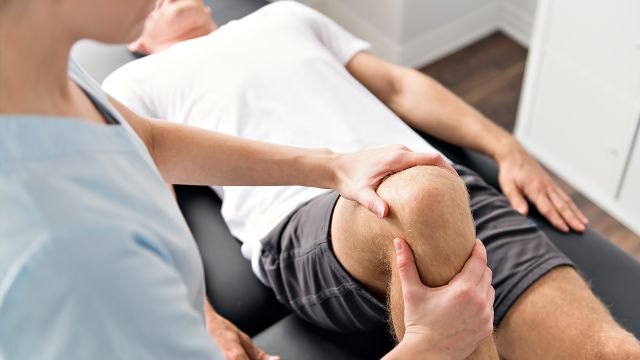Updated on May 2, 2023.
We put an enormous amount of stress on our knees on a daily basis. Typically, the knee is designed to take it. However, there are certain bad habits that hurt your knees and open the door to chronic pain and disability.
The way you stand, walk, and move can have a tremendous effect on the health of your joints. Taking time now to evaluate some basic choices—such as your stance, your shoes, and your level of overall health and fitness—may help you recognize common knee pain causes, side-step debilitating knee conditions like osteoarthritis, and help keep your knees healthy, inside and out.
Ask yourself the following five questions and find out if you're being nice to your knees.
How much weight are you carrying?
Your knees bear the brunt of your body weight, so it's crucial that you try to maintain a healthy weight. If you are carrying extra pounds, you may be compromising the health of your knees. In fact, obesity is one of the biggest risk factors for developing osteoarthritis because it speeds up the breakdown of cartilage.
Dropping extra weight—particularly body fat—may be one of the most helpful things you can do for knee pain. A 2018 meta-analysis published in Obesity Reviews determined that a 5 to 10 percent weight loss significantly improved pain, self-reported disability, and quality of life in obese adults with knee osteoarthritis.
Are you exercising?
Regular physical activity is essential to maintaining knee strength. Without it, your muscles weaken, leaving your joints without ample support and leaving your muscles, bones, tendons, ligaments, and joints vulnerable to misalignment.
Your best bet is to choose activities with a low risk of knee injury. One study published in the British Journal of Sports Medicine in 2020 found that a past knee injury resulted in a nearly six-fold increase in risk for developing knee osteoarthritis. Focus on low-impact activities that build stamina, strength, and flexibility, such as yoga, walking, biking, swimming, and weightlifting. These types of exercises can help enhance circulation, improve your range of motion, and build the muscles that surround the knee joints.
Remember that daily moderate exercise is much better for your joints than occasional strenuous exercise. Aim for a minimum of 30 minutes of exercise on most days of the week and consider these knee-friendly routines:
- Water workouts provide low-impact resistance and add a strength-training aspect to aerobic exercises such as walking or jogging.
- Tai chi can help increase your range of motion, lengthen your muscles, and make your ligaments and tendons more resilient.
- Resistance exercises and yoga strengthen core body muscles as well as leg muscles that support the knee.
Are you overusing some muscles and joints?
Staying active is one of the best things you can do to protect your knees, but you should avoid repetitive strain on muscles and joints. For example, repeatedly engaging in the same taxing activity—whether for work, recreation, or exercise—may damage tendons or cartilage and eventually lead to injuries and possibly even arthritis.
Determining if you are overusing a joint requires listening to your body. When you feel pain or discomfort during or after exercise, household chores, or other activities, don't ignore it. Take a break and consider ceasing the activity altogether until you can perform it without pain. In the meantime, stay active by focusing on other activities that do not stress the injured joint. If the pain does not go away within two weeks, see a healthcare provider (HCP).
To help avoid overuse injuries, spend 5 to 10 minutes warming up before you exercise and another 5 to 10 minutes cooling down afterward.
Is your body properly aligned?
Driving a car when the wheels are out of alignment causes the tires to wear irregularly, and the same principle holds true for your knees. If your body is not properly aligned, your muscles, joints, and ligaments take more strain than they are able to endure healthfully.
Here are some general principles of correct standing posture:
- Your back is straight. Don't slump forward at the shoulders or waist.
- Your knees are slightly bent and not locked.
- Your abdominal muscles are tight.
- Your head is centered over your body. To check this, look at yourself in the mirror from side to side.
- Your weight is evenly distributed between your feet. Do not jut one hip out to the side.
A physical therapist can help you assess your biomechanics and teach you proper standing, sitting, walking, running, and lifting techniques that can help spare your joints from extra wear and tear.
Are you wearing the right shoes?
Your choice of shoes can make all the difference when it comes to knee pain. First, avoid clearly uncomfortable or impractical shoes—such as stiletto heels or thong flip-flops—that can throw your stride off and stress your knees.
Second, be aware that flat or rigid arches, uneven leg length, and bowed legs are fairly common in the general population, and each can contribute to an awkward stride and put pressure on your knees. Consider purchasing at least one of your main pairs of shoes or sneakers at a specialty store where the staff can advise you on which shoes provide the appropriate support for your foot and body type. Before you go, consider a visit with a podiatrist. They can help diagnose any additional foot concerns, such as overpronation (inward foot roll) or supination (outward foot roll), and prescribe orthotic inserts that are placed into your shoes to correct your gait.
Be good to your knees now
Arthritis of the knee is common, but it is not necessarily an inevitable consequence of aging. Steering clear of bad habits that can hurt your knees—and making a few lifestyle changes now—will cost you a lot less time and effort than rehabilitating them down the road.







